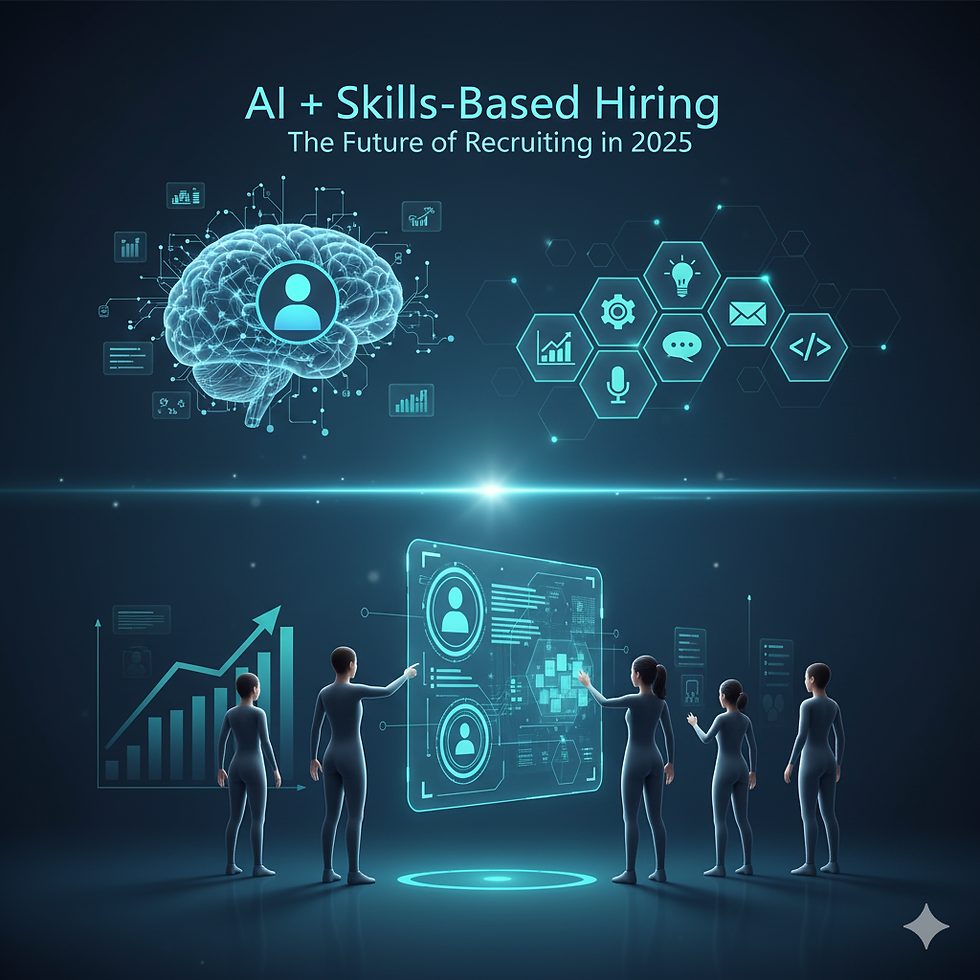Hiring Data Scientists? Why Skills Beat Degrees in 2025
- Saman Nayab
- Jul 23
- 4 min read

Data science is no longer an emerging discipline — it's now the backbone of decision-making for startups and enterprises alike. But hiring great data scientists in 2025 requires more than just scanning for Ivy League degrees or shiny résumés. With the rise of no-code tools, open-source models, and collaborative analytics platforms, real-world skills have become more valuable than academic credentials.
In this blog, we’ll explore why a skills-first hiring strategy is critical for data roles, what technical and soft skills to look for, and how to attract top-performing talent without wasting time (or budget) on the wrong hires.
Why Degrees Alone Aren’t Enough Anymore
It’s not that degrees don’t matter — they just don’t guarantee job-readiness anymore. Here’s why:
1. Curriculum Lag
Many university programs lag behind real-world practices by years. While students learn theory, tools like LangChain, Hugging Face Transformers, or dbt are reshaping how work is done in the field.
2. Portfolio > Pedigree
In 2025, hiring managers are more impressed by a well-documented GitHub repo, a Kaggle competition rank, or a Substack on LLM ethics than a master’s diploma.
3. Accessible Learning
The best data scientists are often self-taught. Platforms like Coursera, DataCamp, Fast.ai, and YouTube have democratized data science education, producing practical, driven professionals who outlearn the classroom.
When companies hire based on academic degrees alone, they often face:
Low on-the-job performance: Candidates may lack hands-on experience.
Slow time-to-productivity: You spend months onboarding someone who’s never deployed a model.
High churn: Overqualified candidates from academic backgrounds may leave when work doesn’t match their research interests.
Homogenous teams: Elite-degree filtering tends to exclude diverse, high-potential candidates from non-traditional backgrounds.
A shift to skills-based hiring helps solve all of the above.
What Skills Actually Matter for Data Science Roles?
Here’s what you should prioritize when hiring data scientists in 2025:
✅ Technical Skills
SQL and Data Wrangling Can the candidate work with messy, real-world data — not just clean CSVs?
Python/R & Libraries Look for fluency with pandas, scikit-learn, TensorFlow, Plotly, etc.
Machine Learning (ML) Workflow From feature engineering to model validation — can they execute end-to-end?
MLOps Basic knowledge of version control, containerization, and model deployment tools like MLflow or Vertex AI is a plus.
Cloud Tools Comfort with BigQuery, AWS SageMaker, or Databricks is increasingly expected.
✅ Communication & Business Acumen
Can they explain complex findings in plain English?
Do they understand the business context behind the data?
Can they challenge stakeholders when metrics don’t align with goals?
The best data scientists aren’t just technical — they’re translators between data and decisions.
How Flat-Fee Recruitment Helps You Hire Skilled Data Talent — Fast
At Behoof, we help companies hire job-ready data professionals in 7–10 days using a skills-first assessment model. No degree filters. No AI-fluffed résumés. Just proof of ability.
Here’s how we do it:
1. Role-Based Assessments
We test candidates with real-world tasks like:
Writing SQL queries to extract business insights
Debugging a scikit-learn pipeline
Explaining a model’s performance in plain English
Every candidate is assessed for practical, job-specific skill — not GPA.
2. Culture Add, Not Just Culture Fit
We evaluate soft skills through asynchronous interviews and psychometric tools to understand how candidates:
Collaborate remotely
Communicate across functions
Challenge assumptions productively
Instead of bloated commissions, we charge $5,000 USD per hire — no matter the role, location, or experience level. You pay for performance, not pedigree.
Case Study: Scaling a Data Team Without a Degree Bias
A Series A FinTech client came to us in early 2025 with a challenge: build a lean data team that could:
Create investor-ready dashboards
Predict churn in their user base
Scale models with limited engineering support
Their existing hiring process filtered candidates by education and years of experience. It wasn’t working.
We helped them shift to a skills-based model. Within 10 days, they made 3 hires:
A former marketer-turned-data analyst who had mastered dbt and Looker
A bootcamp grad who built an NLP model for detecting scam emails
A remote data scientist in Lagos with strong SQL and MLOps skills
Result? Their first predictive model went live in 3 weeks. Internal satisfaction scores jumped 42%. Diversity improved across gender and geography.
Tips to Attract Top Data Science Talent in 2025
If you want to compete for the best — especially as a startup — focus on these levers:
Show Your Stack Top data pros want to work with exciting tools — mention your infra, libraries, and projects.
Give Autonomy Data scientists value freedom to explore and iterate. Highlight flexibility and ownership in the role.
Use Clear, Skill-Focused Job Descriptions Ditch “PhD required” and focus on outcomes: “Build a churn prediction model,” “Deploy dashboards for executives.”
Streamline Your Hiring Process Cut out endless interview rounds. A practical task, async video, and team chat are enough.
Why This Matters for Startup Growth
For startups, every hire counts — especially in data science, where a single capable analyst can unlock insights that shift strategy or extend runway. A skills-first approach allows you to tap into overlooked talent that’s capable, curious, and ready to contribute on Day 1. It also reduces the risks associated with inflated salaries tied to prestigious degrees. In 2025’s competitive talent landscape, startups that focus on outcomes, not résumés, will move faster, innovate smarter, and outpace slower-moving competitors. Hiring for skill isn’t just equitable — it’s a growth advantage.
Final Thoughts: It’s Time to Rethink Data Hiring
Degrees may open doors, but skills close deals.
In 2025, hiring for data science means testing for applied problem-solving, not academic achievement. It’s about who can ship, not just who can theorize.
Let Behoof help you find your next top-performing data hire — fast, fair, and flat-fee.
👉 Book a Free Consultation to learn how we help US startups build data teams without bias or budget bloat.




Comments